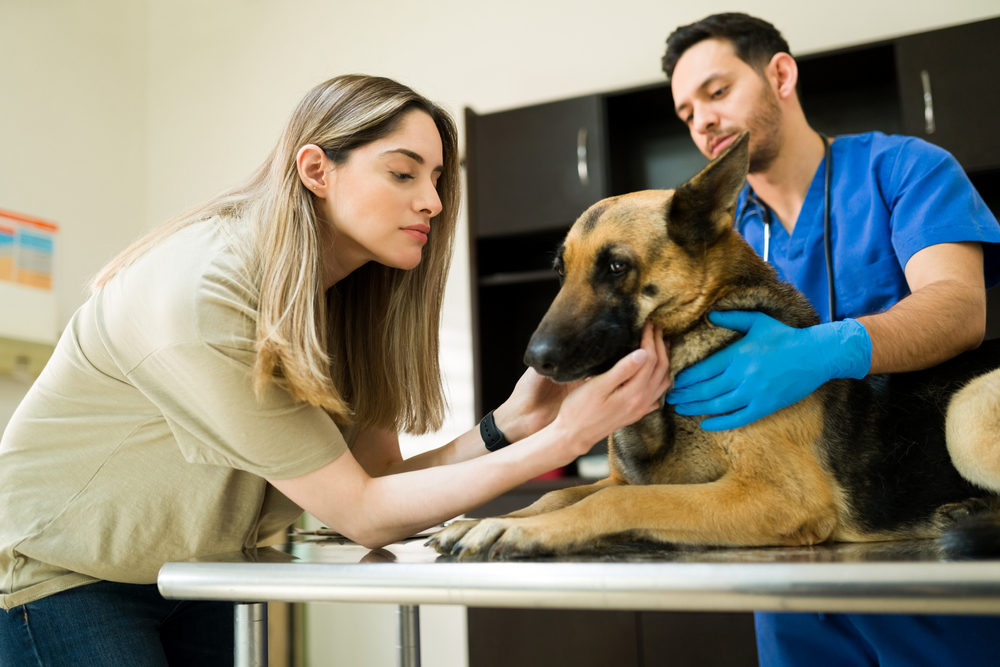Many people have experienced a cold sore or fever blister sometime during their life. For humans, it’s often a painful condition that may come on suddenly. It may also accompany a cold or fever, usually occurring around the mouth. Cold sores result from a viral infection, most often herpes simplex virus type 1 (HSV-1). However, it’s a different story with dogs.
First, canines don’t get HSV-1, and you can’t transmit your condition to your pet. Canines have their own herpes virus but it doesn’t cause mouth sores.1 There are, however, several conditions that can cause mouth sores in dogs.

Causes of Canine Mouth Sores
Canine Stomatitis
Canine stomatitis or chronic ulcerative paradental stomatitis (CUPS) is inflammation of the mouth, mucous membranes, and gums. Gingivitis and mouth sores are often associated with this painful condition. Drooling, bad breath, and feeding avoidance are classic signs.
Susceptible dog breeds include the following:
Trauma
Injuries around the face and lips can look like cold sores. Dogs love to chew and play bite, so every now and then they might get a wound around their lips. If they have had some rough play or a fight recently, they may have had their lip bitten or accidentally bit their own lip. Things like thorns and grass awns can be embedded in the lips causing inflammation, infections, and lumps.

Warts and Tumors
Abnormal growths often pop up around the lips and mouth. Skin cancers like mast cell tumors and benign growths like histiocytomas often start as small lumps that can be ulcerated. A papillomavirus can cause warts to appear in and around the mouth, which can look like cold sores.
Eosinophilic Granuloma Complex
The words “eosinophilic” and “granuloma” describe the type of inflammation seen in eosinophilic granuloma complex. The lesions are inflammatory and occur secondary to insect bites or other allergic reactions. Eosinophilic granuloma has the appearance of lumps or sores as a break in the mucous membrane. However, they don’t just occur in the mouth and on the lips. You may also see them on your pup’s thighs or anywhere else on your pooch’s body. Terriers and long-nosed large breeds are particularly susceptible.

Treatment of Mouth Sores
The treatment depends on what’s causing the cold sore. Remember that they aren’t diagnostic of themselves. Your vet may need to biopsy the lesions or assess the response to a preliminary treatment plan.
Skin cancers usually need surgical removal, but other growths like histiocytomas and viral warts can sometimes resolve on their own.

Treatment for CUPS can be challenging, depending on the extent of the disease and infection. Excellent oral hygiene and care are at the crux of recovery. It also involves antibiotics to control secondary bacterial infections and other complications and pain relief. The owner’s compliance with home care is imperative. Your vet may also prescribe prednisone, a corticosteroid. It brings its own trials.
Treatment for eosinophilic granuloma begins with managing the signs and effects of the sore. It also involves identifying the trigger. If it’s stinging insects, your plan will extend to containing that problem. A local beekeeper can help if honeybees are the problem. They may remove them for free if you let them take the insects away.

Frequently Asked Questions (FAQ)
What Diet is Best for a Dog With Mouth Sores?
Mouth sores are often painful. They may put your dog off their feed because it hurts to eat. Your vet may suggest a canned diet that is easier to eat than kibble.
What Else Can I Do to Treat These Sores?
Your vet may suggest putting an Elizabethan or e-collar on your dog if they are pawing at the wound site. We recommend using a clear one to prevent your pet from running into walls or furniture.
Are Mouth Sores Preventable?
Prevention depends on the cause. For example, good oral hygiene can help prevent CUPS. Regular veterinary care can go a long way toward early detection and less stressful treatment. We suggest getting your dog used to having their mouth touched and examined. It’ll make brushing your pet’s teeth easier, which is the most effective way to maintain good dental health.

Final Thoughts
Dogs can’t get cold sores from herpesvirus but they can get other mouth sores. Different disease processes are at work in each case. While they are sometimes self-limiting in people, that’s not always the case with canines. It all rests with the cause of the problem. It can run the gamut from a benign issue to something more challenging to treat. It makes a strong case for regular veterinary care.
Featured Image Credit: Josep Suria, Shutterstock
